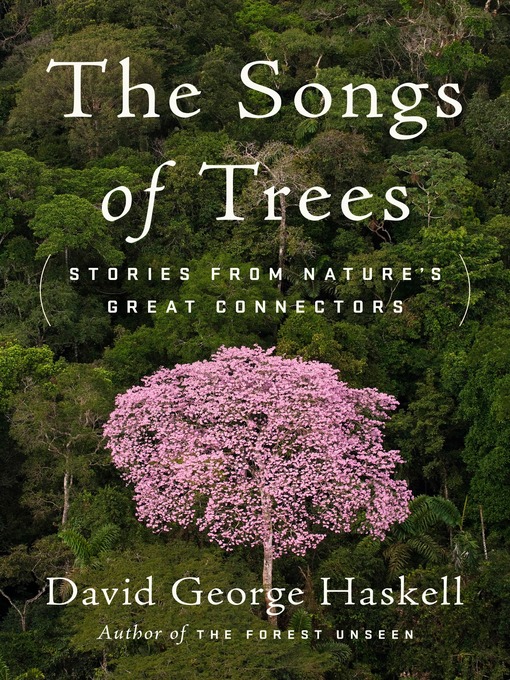The Songs of Trees
Stories from Nature's Great Connectors
"At once lyrical and informative, filled with beauty." – Elizabeth Kolbert, author of The Sixth Extinction
David Haskell’s award-winning The Forest Unseen won acclaim for eloquent writing and deep engagement with the natural world. Now, Haskell brings his powers of observation to the biological networks that surround all species, including humans.
Haskell repeatedly visits a dozen trees around the world, exploring the trees’ connections with webs of fungi, bacterial communities, cooperative and destructive animals, and other plants. An Amazonian ceibo tree reveals the rich ecological turmoil of the tropical forest, along with threats from expanding oil fields. Thousands of miles away, the roots of a balsam fir in Canada survive in poor soil only with the help of fungal partners. These links are nearly two billion years old: the fir’s roots cling to rocks containing fossils of the first networked cells.
By unearthing charcoal left by Ice Age humans and petrified redwoods in the Rocky Mountains, Haskell shows how the Earth’s climate has emerged from exchanges among trees, soil communities, and the atmosphere. Now humans have transformed these networks, powering our societies with wood, tending some forests, but destroying others. Haskell also attends to trees in places where humans seem to have subdued “nature” – a pear tree on a Manhattan sidewalk, an olive tree in Jerusalem, a Japanese bonsai– demonstrating that wildness permeates every location.
Every living being is not only sustained by biological connections, but is made from these relationships. Haskell shows that this networked view of life enriches our understanding of biology, human nature, and ethics. When we listen to trees, nature’s great connectors, we learn how to inhabit the relationships that give life its source, substance, and beauty.
Read by Cassandra Campbell, with the preface and two interludes read by the Author
-
Creators
-
Publisher
-
Release date
April 4, 2017 -
Formats
-
OverDrive Listen audiobook
- ISBN: 9781524750541
- File size: 300492 KB
- Duration: 10:26:01
-
-
Languages
- English
-
Reviews
-
AudioFile Magazine
Trees have songs, says Haskell, and he wants to record them. Cassandra Campbell's narration is soothing and perhaps musical, a good match to Haskell's descriptive writing on the beauty of trees. He starts his global tour in the Amazonian forest of Ecuador, where he considers the environment of a sabo tree. He then discusses the spiders and monkeys that surround it, and the oil fields that threaten it. Campbell's voice stays soft but adds an edge when the subjects aren't so poetic, as when Haskell describes the bite of a bullet ant. Her edgy tone hints at the pain. As the author visits both remote and urban locations, he gives coordinates so that listeners themselves can find the trees he describes if they're in the vicinity. J.A.S. © AudioFile 2017, Portland, Maine -
Publisher's Weekly
February 27, 2017
In this inspiring but uneven account, Haskell (The Forest Unseen), professor of biology at Sewanee, investigates the myriad connections between trees and their natural surroundings. Trees do not exist in isolation, he notes, and though their “trunks seemingly stand as detached individuals, their lives subvert this atomistic view.” He devotes each of his 10 chapters (plus two interludes) to a particular tree, visiting Ecuador, Japan, and various points in North America. In Amazonian Ecuador, for example, Haskell calls attention to the ceibo tree, describing local hummingbirds, frogs, and monkeys before touching on oil-drilling camps now found in the rainforest. The heavy machinery cannot be ignored; “half of Ecuador’s export revenues and one third of the government’s budget come from oil.” Juxtaposing contrasting images of nature in urban landscapes, Haskell describes the worlds revolving around a cottonwood tree in Denver and a callery pear in Manhattan in lively chapters full of engaging digressions and meditations. But the chapters on a balsam fir in Ontario and maples in Tennessee and Illinois are harder to read, sometimes dazing readers with tangential and obscure references. Despite a few weak spots, Haskell’s study of interconnectedness reveals as much about humans as it does trees. Agent: Alice Martell, Martell Agency.
-
Loading
Why is availability limited?
×Availability can change throughout the month based on the library's budget. You can still place a hold on the title, and your hold will be automatically filled as soon as the title is available again.
The Kindle Book format for this title is not supported on:
×Read-along ebook
×The OverDrive Read format of this ebook has professional narration that plays while you read in your browser. Learn more here.


